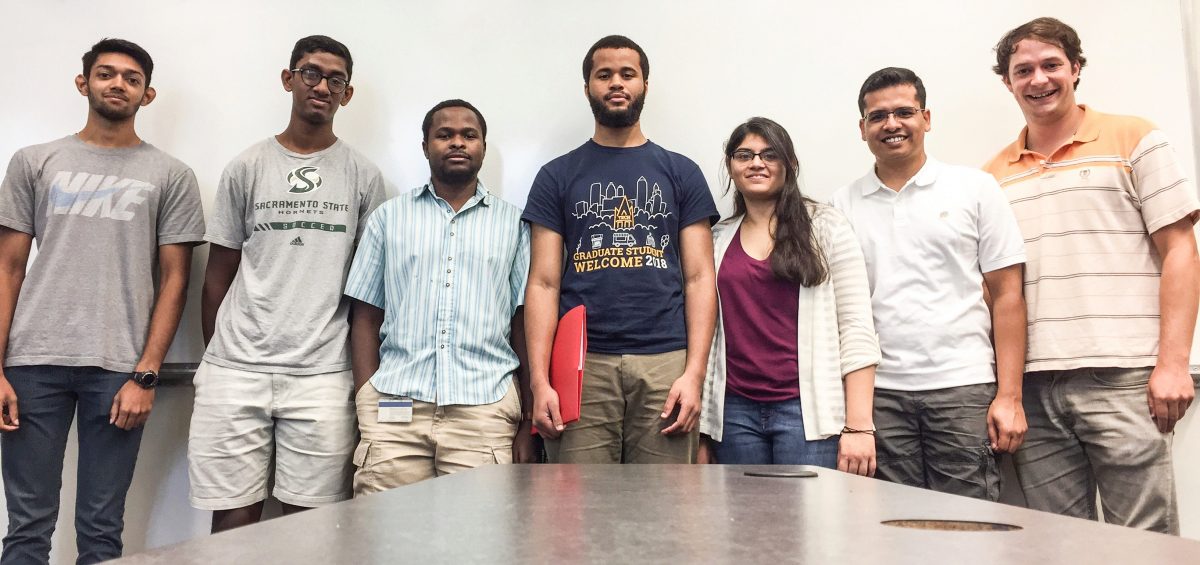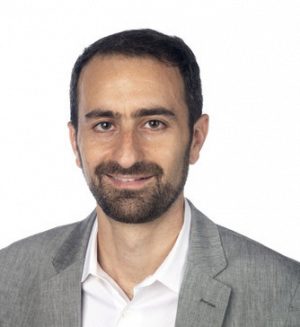 Vertical Lift Society Leaders. The newly elected officers of the newly re-branded Vertical Lift Society (VFS) at Georgia Tech are, from left, Kaushik Reddy, (undergraduate liaison), Vikram Balaji, (secretary), Nicholson Koukpaizan (vice president), Chams Mballo (membership chair), Aarohi Shah (president), Mohit Gupta (treasurer), and Etienne Demers Bouchard (social media chair). The group is sponsoring a tour of the AE Rotorcraft Simulation Lab on Nov. 2. Find out how you can join them, or find out more about the VFS Chapter at Georgia Tech.
Vertical Lift Society Leaders. The newly elected officers of the newly re-branded Vertical Lift Society (VFS) at Georgia Tech are, from left, Kaushik Reddy, (undergraduate liaison), Vikram Balaji, (secretary), Nicholson Koukpaizan (vice president), Chams Mballo (membership chair), Aarohi Shah (president), Mohit Gupta (treasurer), and Etienne Demers Bouchard (social media chair). The group is sponsoring a tour of the AE Rotorcraft Simulation Lab on Nov. 2. Find out how you can join them, or find out more about the VFS Chapter at Georgia Tech.
Rotorcraft enthusiasts on the Daniel Guggenheim School campus no longer have a local chapter of the American Helicopter Society (AHS) to aggregate their interests. They have something a little better.
 |
| Prof. Jonathan Rogers |
The Vertical Flight Society (VFS), is a rebranded version of the world’s oldest and largest technical society (AHS) dedicated to enhancing the understanding of vertical flight technology. Authorized by AHS International this past spring, the name change signals the organization's renewed commitment to embracing technologies that are daily transforming rotorcraft design, research, and flight.
"A name means a lot," says Aerospace Engineering professor Jonathan Rogers, the faculty advisor for the new VFS Chapter at Georgia Tech.
"NextGen vehicles that are capable of vertical lift do not look anything like what people think of when they think helicopter. And there has been an explosion of new companies who are designing drones, and other EVTOL concept vehicles because the technology and the demand for these vehicles are both strong. If we continued to use 'helicopter' to describe this area of flight, we'd be ignoring a lot of technologies that do not fit neatly under that label."
Rotorcraft students returning to campus this fall applauded the new name.
"The name change increased the spectrum of research we can tackle," said Aarohi Shah, the newly elected president of the VFS Chapter at Georgia Tech. Under the tutelage of Prof. Julian J. Rimoli, Shah's doctoral research focuses on on extending the life of the collective and cyclic pitch links in Blackhawk helicopters. Eventually, she says, her findings will advance component improvements on different types of rotorcraft.
"It used to be that rotorcraft meant helicopters, but we know that there are so many - tilt-rotors, co-axial rotors, multi-rotor systems, micro-air vehicles, and UAVs - that we cannot limit ourselves. My research is supported by the U.S. Army, but there are so many doors opening up with private companies, like Amazon, who want to put this technology to work. "
On this point, Rogers very much agrees.
"Vertical flight is one of the strongest places for aerospace engineers to find a career. To me, vertical lift technology is ready to be commercialized - not 20 years down the road, but now. As cities are getting more densely populated, the whole concept of urban air mobility is allowing people to decide whether they want to drive around or fly around. There's a market here, and there are investors ready to invest, so the jobs will be there, too. By recognizing that trend in this change, the Vertical Lift Society really recognized what people want and need to learn to succeed."
Doctoral student Mohit Gupta served as the previous president of the chapter. He was recently elected treasurer of the VFS.
"Vertical flight really opens up a lot areas for students to pursue. There are commercial uses, and urban air mobility, but there's also the military, where drones will eventually change the turn-around time for delivering medical supplies to rugged terrain, for surveillance. You can't expect even a well-designed plane to take off and climb as quickly as a vertical lift vehicle, a drone."
Want to know more about Georgia Tech's commitment to vertical lift research? Visit the Vertical Lift Research Center of Excellence (VLRCOE), where cutting-edge collaborations in this field are having an impact.